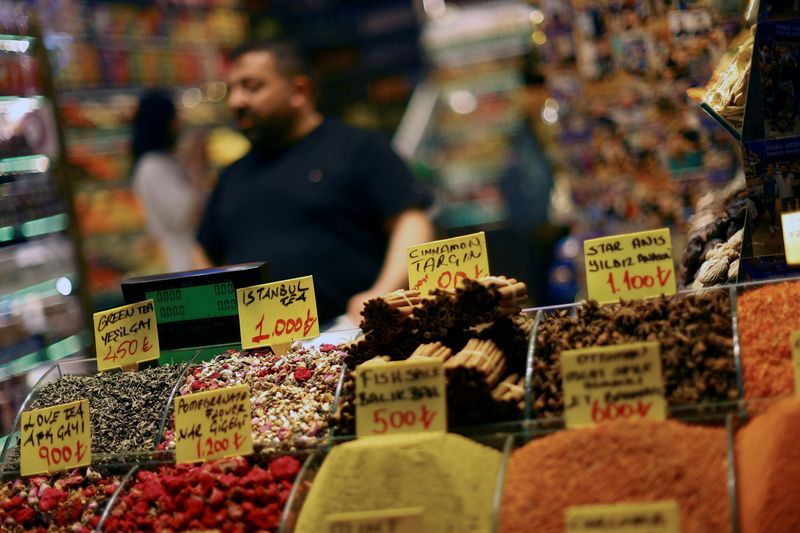By Daren Butler and Oben Mumcuoglu
ISTANBUL (Reuters) -Turkish annual consumer price inflation reached 75.45% in May, a bit above expectations, official data showed on Monday, in what is expected to be the high watermark before a series of rate hikes and relative lira stability bring relief.
The consumer price index rise was driven by strong advances in education, housing and restaurant prices last month, Turkish Statistical Institute data showed.
Monthly inflation is also expected to ease after May, when it was 3.37%, compared with 3.18% in April, the data showed. Annual inflation in April was 69.80%.
Finance Minister Mehmet Simsek said "the worst is over" and relief will begin this month. "The transition period in the fight against inflation is completed, we are entering the disinflation process," he said on X.
In a Reuters poll, annual inflation had been forecast to peak at 74.8% in May, its highest level since November 2022, before dropping to 42.6% by the end of 2024. Forecasts for month-on-month price rises ranged between 2.7% and 3.3%.
The central bank has raised its policy rate by 4,150 basis points since June last year and vowed to tighten more if there is "a significant and persistent deterioration" in the outlook.
It last raised rates in March, by 500 basis points to 50%, citing a worsening inflation outlook, and has since held steady.
The tightening marked a dramatic reversal of years of monetary stimulus that was championed by President Tayyip Erdogan to boost growth, but which sent inflation soaring and sparked a years-long cost-of-living crisis for Turks.
As a result the lira, steady on Monday, has skidded to 32.25 to the dollar from 5.7 five years ago. It is down more than 8% this year but held mostly steady since March, helping underpin the expected inflation relief.
"We're confident that inflation has now reached a peak but, with today's release containing a few unpleasant surprises, the pace of disinflation in the second half of the year is looking a bit more uncertain," Capital Economics said in a nod to the higher-than-expected print.
The domestic producer price index was up 1.96% month-on-month in May for an annual rise of 57.68%, the data showed.
The policy reversal has drawn foreign investor interest and helped boost the central bank's foreign reserves, which are at the highest level since December on a net basis.

International investors are ramping up exposure to Turkish local bonds and credit default swaps. JPMorgan said it had moved its allocation to Turkish domestic government bonds to "overweight", citing increasing confidence in the policy.
Last month, the central bank nudged up its year-end inflation forecast to 38% and said it would "do whatever it takes" to avoid any longer-term deterioration in the outlook.